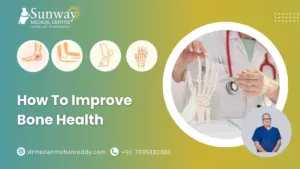Taking care of your bones is crucial for a healthy and active life. Also Learning how to improve bone health in women can help you avoid conditions like osteoporosis, fractures, and bone pain. Strong bones support your body’s structure, protect vital organs, and keep you mobile. This blog will share simple tips on how to improve bone health, including lifestyle changes, diet, and exercise. By following these strategies, you can enjoy strong, healthy bones for years to come.

Why is Bone Health Important?
Bone health is vital for overall well-being. Healthy bones provide structure to the body, protect organs, and enable movement. Without strong bones, we are more likely to experience fractures, pain, and conditions like osteoporosis. Learning how to improve bone health helps you avoid these problems. Learning why bone health is important and how to improve bone health in women is important as hormonal changes during menopause lead to faster bone loss. Proper care ensures your bones stay strong, preventing complications later in life.
What Affects Bone Health?
Several factors can affect your bone health. Age, gender, diet, and physical activity all play a role. How to improve bone health involves understanding these factors. As we age, bones naturally lose density, making them weaker and more prone to fractures. Hormonal changes, especially in women, can accelerate bone loss. A diet low in calcium and vitamin D, along with a lack of exercise, can also harm bone health. Protecting your bones requires taking these factors into account and making the right lifestyle choices.
What Can I Do to Keep My Bones Healthy?
To maintain strong bones, it’s important to know how to improve bone health. Start by eating a diet rich in calcium and vitamin D. Engage in regular weight-bearing exercises, like walking, running, or lifting weights. These activities help stimulate bone growth and prevent bone loss. You should also avoid smoking and excessive alcohol, as these can weaken bones. By following these simple steps, you’ll support your bone health and reduce the risk of fractures and other bone-related problems.
10 Natural Ways to Build Healthy Bones
1.Increase Calcium Intake: Your bones are primarily made of calcium, so include calcium-rich foods like dairy products, almonds, leafy greens, and fortified plant-based milk in your diet.
2.Get Enough Vitamin D: Vitamin D helps your body absorb calcium. Spend time in sunlight, and include foods like fatty fish, egg yolks, and mushrooms.
3.Weight-Bearing Exercise: Engage in activities like walking, running, dancing, or strength training to improve bone density.
4.Eat More Protein: Protein supports bone structure, so make sure to have adequate amounts from sources like lean meats, lentils, beans, tofu, or nuts.
5.Consume Magnesium and Zinc: Both minerals are vital for bone health. Nuts, seeds, whole grains, and dark chocolate are good sources.
6.Maintain a Balanced Diet: Include fruits and vegetables to ensure you get enough vitamin K, C, and other nutrients crucial for bones.
7.Limit Caffeine and Soda: Excessive caffeine and phosphoric acid in soda can weaken bones over time.
8.Avoid Smoking and Limit Alcohol: Both can negatively affect bone health and reduce bone mass.
9.Strengthen with Omega-3 Fatty Acids: Found in fish like salmon, chia seeds, flaxseeds, and walnuts, omega-3s support bone health.
10.Stay Active and Maintain a Healthy Weight: A sedentary lifestyle or being underweight can weaken bones, so aim for regular physical activity and a balanced weight.
Food for Healthy Bones
A healthy, balanced diet plays a critical role in supporting bone health. The right nutrients can help you build and maintain strong bones. Here are some foods that are known to improve bone health:
- Calcium-rich foods: Calcium is essential for bone strength and plays a major role in bone formation. Include dairy products like milk, yogurt, and cheese, as well as leafy green vegetables like kale, spinach, and broccoli.
- Vitamin D: Vitamin D helps the body absorb calcium efficiently. Include fortified foods like milk and cereals, as well as fatty fish like salmon and tuna.
- Magnesium: This mineral helps in calcium absorption and bone formation. Almonds, pumpkin seeds, and whole grains are rich sources.
- Protein: Protein is vital for bone health and helps the body build bone cells. Incorporate lean meats, beans, lentils, and tofu into your diet.
Incorporating these foods into your daily meals can contribute to stronger bones and improve your bone density over time. Remember, what supports bone health involves proper nutrition, and adopting a healthy diet is one of the key elements in how to improve bone health in women.
Too Much Vitamin A
While vitamins are essential for bone health, it’s important to be mindful of the amounts you’re consuming. Excessive vitamin A intake, often through supplements, factors that affect bone healing. Studies suggest that too much vitamin A can interfere with vitamin D, which is crucial for calcium absorption. The result can be weaker bones, making them more susceptible to fractures.
Is It Too Late to Build Bone Density?
A common question among individuals, especially as they age, is whether it’s too late to build bone density. The answer is no! While peak bone density typically occurs in your late 20s, how to improve bone health later in life is still very possible. Here are a few things you can do:
- Eat a balanced diet: Including calcium, vitamin D, and other bone-supportive nutrients can help strengthen bones at any age.
- Exercise regularly: Weight-bearing exercises like walking, jogging, or strength training can stimulate bone growth and improve bone density.
- Bone density tests: These tests can help monitor bone health, especially for those at higher risk of osteoporosis or other bone diseases.
Building and maintaining bone density is a lifelong process. Whether you’re in your 20s, 50s, or beyond, there are ways to actively improve bone health in women and men, and it’s never too late to start.
Other Ways to Protect Your Bones
There are additional lifestyle changes that can enhance bone strength. Here are some ways to improve bone health beyond just diet and exercise:
- Quit smoking: Smoking negatively impacts bone health by reducing blood flow to bones and hindering the body’s ability to absorb calcium.
- Limit alcohol: Drinking excessive alcohol weakens bones and increases the risk of fractures.
- Get adequate sleep: Sleep is essential for overall body recovery, including bone healing and growth.
- Maintain a healthy weight: Being underweight increases the risk of bone loss, while being overweight can put excess strain on the bones.
These lifestyle habits are crucial when thinking about why bone health is important, and making small changes in your daily routine can yield significant benefits over time.
What Types of Exercise Help with Bone Strength?
Exercise is an integral part of how to improve bone health. Certain exercises are particularly beneficial for building bone strength and preventing bone loss:
- Weight-bearing exercises: These exercises force you to work against gravity and help stimulate bone growth. Examples include:
- Walking
- Running
- Dancing
- Hiking
- Walking
- Resistance training: Using weights or resistance bands helps build muscle, which in turn strengthens bones. Try:
- Lifting weights
- Bodyweight exercises like squats and lunges
- Lifting weights
- Balance exercises: These exercises help reduce the risk of falls and fractures. Incorporate activities like:
- Yoga
- Tai chi
- Pilates
- Yoga
By engaging in these exercises, you can improve bone strength and prevent conditions like osteoporosis. What supports bone health is a combination of diet and exercise, and regularly incorporating these activities into your routine will help you stay strong.
Conclusion
Caring for your bones is essential for maintaining an active and healthy lifestyle. Knowing how to improve bone health can help you prevent bone loss, fractures, and conditions like osteoporosis. By eating a balanced diet, staying active, and avoiding harmful habits, you can protect your bones throughout life. Learn why bone health is important and make it priority today, and you’ll enjoy stronger bones tomorrow. Incorporating the tips above will help ensure your bones remain healthy and strong for years to come.






